|
|
|
Sort Order |
|
|
|
Items / Page
|
|
|
|
|
|
|
| Srl | Item |
| 1 |
ID:
121760
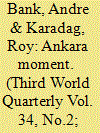

|
|
|
|
|
| Publication |
2013.
|
| Summary/Abstract |
Around 2007 Turkey became a regional power in the Middle East, a status it has maintained at least until the outset of the Arab Revolt in 2011. To understand why Turkey only became a regional power under the Muslim akp government and why this happened at the specific point in time that it did, this article highlights the self-reinforcing dynamics between Turkey's domestic political-economic transformation in the first decade of this century and the advantageous regional developments in the Middle East at the same time. It holds that this specific linkage-the 'Ankara Moment'-and its regional resonance in the neighbouring Middle East carries more transformative potential than the 'Washington Consensus' or the 'Beijing Consensus' so prominently discussed in current global South politics.
|
|
|
|
|
|
|
|
|
|
|
|
|
|
|
|
| 2 |
ID:
121759
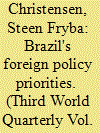

|
|
|
|
|
| Publication |
2013.
|
| Summary/Abstract |
As Brazil has risen to become an increasingly significant regional and global player in a world undergoing significant transformations in terms of power balance, the subject of its aims, world-view and foreign policy strategies is becoming increasingly relevant. This article focuses on the most important themes and priorities in Brazil's foreign policy orientation between 2003 and 2012 and connects these to the Brazilian government's world-view, its view of Brazil's role in the world, and to the main aims pursued by Brazil in its overall development strategy. I discuss how Brazil's view of the world and its foreign policy priorities relate to the USA's view and preferences, arguing that Brazil's foreign policy priorities reflect the fact that the USA and the West in general are often seen as barriers to Brazil's main aims. These are to achieve economic strengthening, a growing influence on the international political scene and a leadership position in South America, and through this to contribute to major changes in the global order.
|
|
|
|
|
|
|
|
|
|
|
|
|
|
|
|
| 3 |
ID:
121757
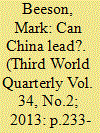

|
|
|
|
|
| Publication |
2013.
|
| Summary/Abstract |
The 'rise of China' is proving to be one of the most consequential developments of the early 21 century One of the key questions it raises is about the impact this historically unprecedented process will have on the East Asian region in particular and the world more generally. Will Chinese policy makers will be able to translate the country's growing material importance into other forms of political power and influence? Equally importantly, will Chinese elites be 'socialised' into the practices and norms of extant institutions, or will they attempt to redefine them to further Chinese foreign policy goals? This paper explores these questions by initially looking at the overall historical context in which East Asian regionalisation has occurred, before considering the operation of some of the more important regional institutions. It is suggested that China's ability to offer regional leadership is constrained both by its own security policies?which are seen as increasingly threatening by many of its neighbours?and by the actions of the USA, which is trying to reassert its own claims to regional leadership. While the outcome of this process is inconclusive, it helps us to understand the more general dynamics reshaping the international system as a result of the emergence of new centres of international power.
|
|
|
|
|
|
|
|
|
|
|
|
|
|
|
|
| 4 |
ID:
121755
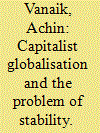

|
|
|
|
|
| Publication |
2013.
|
| Summary/Abstract |
Ever-expanding capital accumulation cannot be stable or cumulative without coordination and regulation provided by the state and the system of states, wherein the subset of the most powerful states is vital for establishing stability. There is a hegemonic transition of sorts towards a new quintet of powers in which the USA will remain indispensable as the key coordinator. Pretensions regarding China as the new hegemon are exposed as also are Indian claims. Moreover, it is argued that the brics grouping cannot provide an effective alternative to the quintet. However, the likely failure of the quintet to guarantee future stability raises the issue of the viability of capitalism itself. Transiting towards a post-capitalist order requires as a necessary if insufficient condition confronting the informal empire project of the USA that underpins capitalist globalisation.
|
|
|
|
|
|
|
|
|
|
|
|
|
|
|
|
| 5 |
ID:
121761


|
|
|
|
|
| Publication |
2013.
|
| Summary/Abstract |
In the recent past the Western-dominated global institutional order has come to be challenged by the bloc of rising powers. The question of whether brics has the ability to reshape global governance is an important one and carries significance for the global South, which has been adversely affected by global institutions. Yet the reliance on the capacity, or the will, of rising powers to speak for the global South, or to prioritise the concerns of their own people might be misplaced. Conceivably the only way both global institutions and governments can be compelled to heed the voices of the poorest of the poor is through sustained activism in civil society. In a globalised world, civil society activism has to be global in scope. Civil society might not be the best solution to the problems of the world, but in a disenchanted post-revolutionary world, it is the only option on offer.
|
|
|
|
|
|
|
|
|
|
|
|
|
|
|
|
| 6 |
ID:
121756
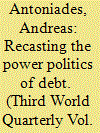

|
|
|
|
|
| Publication |
2013.
|
| Summary/Abstract |
The 2007-08 financial crisis exposed and exacerbated the debt pathologies of the West. This paper examines whether the new global debt relations that have been generated by this crisis have transformed global power politics, changing the way in which the global South and the global North interrelate and interact. To do so the paper analyses the G20 advanced and emerging economies, examining a number of key indicators related to debt, indebtedness and financial leverage. This research leads to two main findings. First, the crisis has indeed given rise to new global debt relations. As a result, any reforms in the post-crisis global political economy will take place in an environment that favours the rising powers. Second, the USA maintains its capacity to control the parameters of this new global debt politics and economics, but cannot directly impose the terms of a solution to the existing 'global/hegemonic imbalances' on the rising powers.
|
|
|
|
|
|
|
|
|
|
|
|
|
|
|
|
| 7 |
ID:
121762
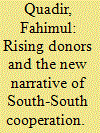

|
|
|
|
|
| Publication |
2013.
|
| Summary/Abstract |
This article aims to provide a critical analysis of how the 'emerging donors' are redefining the structure of development cooperation in the new millennium. It offers an overview of the growing role of Brazil, China, India and South Africa in shaping the conditionally driven framework of official development cooperation. By reviewing the aid coordination mechanisms of the Southern donors, the article also seeks to provide a context for comprehending the challenges for Southern countries to systematically manage, monitor and deliver aid. It argues that the Southern donors' interest in changing the dominant conditionality driven narrative of aid has opened up the possibility for constructing a new aid paradigm that focuses more on the strategic needs of the partner countries than on advancing the ideological interests of the donor countries. However, without assuming a much greater role in providing overseas aid and without building a unified platform based on a shared development vision, Southern donors will not be able to meaningfully alter the current dac -dominated aid architecture.
|
|
|
|
|
|
|
|
|
|
|
|
|
|
|
|
| 8 |
ID:
121763
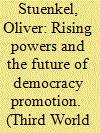

|
|
|
|
|
| Publication |
2013.
|
| Summary/Abstract |
The dominant position established powers have traditionally held in global affairs is slowly eroding. One of the issues profoundly affected by this process will be democracy promotion, an area traditionally dominated by the USA and Europe on both the policy and the academic level. While several rising democracies-such as Brazil and India-may seem, from a Western point of view, to be ideal candidates to assist the USA and Europe in promoting democracy in a 'post-Western World', emerging powers like these are reluctant to embrace the idea. What does this mean for the future of democracy promotion once the USA's and Europe's international influence declines further?
|
|
|
|
|
|
|
|
|
|
|
|
|
|
|
|
| 9 |
ID:
121754
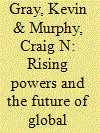

|
|
|
|
|
| Publication |
2013.
|
| Summary/Abstract |
There has been much debate over the extent to which the rising powers of the global South are challenging contemporary global political and economic governance. While some observers see an emancipatory potential in the redistribution of power among states, others see the rising powers as firmly located within the Western-centred neoliberal world order. This collection of papers seeks to go beyond the state-centrism of existing approaches by examining how challenges to global governance by rising powers are rooted in specific state-society configurations. Through studies of Brazil, India, China and other important developing countries within their respective regions, such as Turkey and South Africa, the papers examine the way domestic structures, arrangements, actors and dynamics influence the nature of the international interventions and behaviour of rising powers. They ask how their increased political and economic enmeshment in the international system impacts upon their own internal societal cohesion and development. By examining these issues, the papers raise the question of whether the challenge posed by the rising powers to global governance is likely to lead to an increase in democracy and social justice for the majority of the world's peoples.
|
|
|
|
|
|
|
|
|
|
|
|
|
|
|
|
| 10 |
ID:
121758


|
|
|
|
|
| Publication |
2013.
|
| Summary/Abstract |
South Africa's role in global economy and geopolitics was, during the apartheid era, explicitly sub-imperialist, as the West's 'deputy sheriff' in a tough neighbourhood But, with democracy in 1994, there arose a debate surrounding the difference between the liberation government's (leftist) foreign policy rhetoric and its practice. Defining the sub-imperial standpoint at this stage is important in because of the extreme economic, social and environmental contradictions that have worsened within South Africa, for which anti-imperialist rhetoric is sometimes a salve. However, the explicit strategies for global engagement chosen by Pretoria, including joining the Brazil-Russia-India-China (bric) alliance in early 2012, have not proven effective in reforming world power relations. The degree to which brics has recently accommodated imperialism-especially in matters related to economic and ecological crises-suggests that critics should more forcefully confront the general problem of sub-imperial re-legitimation of neoliberalism. That problem requires a theory of sub-imperialism sufficiently robust to cut through the domestic and foreign policy claims made by the brics regimes, of which South Africa's are among the most compelling given the ruling elite's ubiquitous 'talk left, walk right' tendency and the extremely high levels of social struggles against injustice that result.
|
|
|
|
|
|
|
|
|
|
|
|
|
|
|
|
|
|
|
|
|